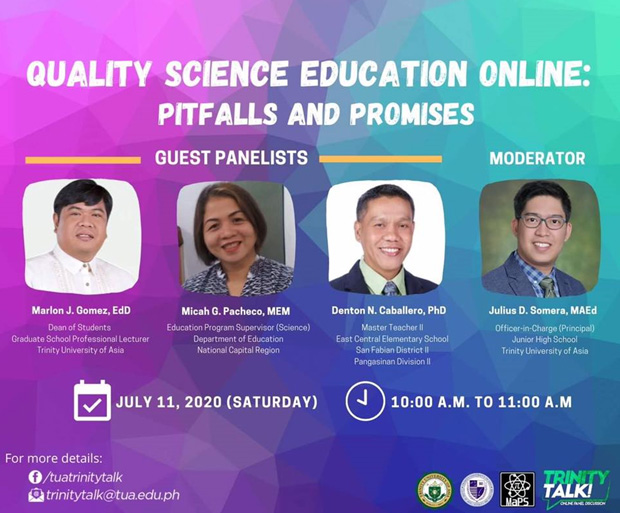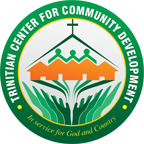QUALITY SCIENCE EDUCATION: PITFALLS AND PROMISES
Trinity Talk Episode 5: July 11, 2020
by Prof. Julius D. Somera, MAEd

INTRODUCTION
Last July 11, 2020, the Mathematics and Physical Sciences Department (MaPS) of College of Arts, Sciences, and Education hosted the fifth episode of Trinity Talk: An Online Panel Discussion with the theme, Quality Science Education Online: Pitfalls and Promises. The virtual event was witnessed by students, teachers and other professionals in different parts of Metro Manila and nearby provinces. It reached 3.5K views with 76 shares and 314 comments. The equally brilliant guest panelists were good representations of the different educational levels from elementary school up to the graduate school level. The panelists gave their insights and expertise on the different challenges in the new normal setup of school particularly that of mathematics and science education.
ABOUT THE PANELISTS

Dr. Denton N. Caballero is a Master Teacher II of East Central Elementary School from San Fabian District II of Pangasinan Division II. He is an alumnus of Trinity University of Asia, then Trinity College of Quezon. He graduated his Bachelor, Master’s and Doctoral degrees all with flying colors. He is also a recipient of different division, provincial, regional and national recognition and awards. The recent ones are the 2019 National Search for Best Science Implementers and the 2018 Civil Service Commission Search for Outstanding Government Worker – PAGASA. Has has 18 years teaching experiences in Elementary education.
Prof. Micah G. Pacheco is the Education Program Supervisor for Science of Department of Education in National Capital Region. She is currently the trainer/expert of the Project RAS 0079, a program for educating the teachers on Nuclear Science and Technology. These trainings were held in different parts of the globe like Yogyakarta, Indonesia (2018), Argonne, USA (2018), Tokyo, Japan (2019), Manila, Philippines (2019), Kajang, Malaysia (2019), and Argonne, USA (2019). Also, she is a STAR (Science Teacher Academy of the Region) Trainer under the DOST- Science Education Institute.
Dr. Marlon J. Gomez is an experienced Dean of Students with a demonstrated history of working in the higher education industry. Skilled in Quality Management, Quality Assurance, Student Development, E-Learning, and Quality Auditing. He is also an education professional with a Doctor of Education (Ed.D.) focused in Educational Leadership and Administration, from Trinity University of Asia, Graduate School.
DISCUSSION
1. This coming school year, many if not all educational institutions will be offering math and science courses through an online platform with little or no face-to-face classes. In your opinion, will the quality of math and science education suffer in the following levels? – elementary, junior high school, senior high school, college and graduate school?
- Caballero mentioned that teaching science for elementary pupils was very challenging. Some of the reasons he cited were the computer literary of pupils, the closed supervision of adults to guide the pupils in learning the modules at home, the preparation of teachers and the internet and hardware resources to do online learning.
- Pachero shared that when we considered quality science education in an online modality, we must consider the following: 1) the accessibility to technology; 2) the readiness of students; 3) the qualities and skills of facilitators; 4) the readiness of administration and skills of teachers; 5) the online learning environment; and 6) the curriculum.
- Gomez shared that there are variations in the different educational setups. There are challenges like students’ and teachers’ readiness in the adoption of e-learning technology and the readiness of school in integrating eLearning to its regular means of delivery of curriculum.
2. How ado veteran math and science teachers in various educational levels feel about online classes? Are they prepared or equipped?
- Pacheco emphasized the two types of teachers: 1 – digital natives teachers who they can easily adapt in the technology but challenged in terms of resources like internet connection and the 2 – digital immigrants who are really challenged in the new normal with little knowledge and skills in technological aspects of teaching. She argued that teachers must adapt in these changes. “Adaptability is the name of game”, she added.
- Gomez said it depends on teachers’ capability in reacting to change and ask teachers or assess them of their needs in preparation for eLearning. He shared that most of attendees on webinars majority are excited and the minority are retiring. He emphasized that, “It is not about the ability but the capacity of what we have and the ability of their organization.”
- Caballero shared that the readiness and preparedness in the elementary is still on undertaking. He assured that the quality that the students need will still be given.
3. How are math and science laboratory activities possible through online classes in the different educational levels? Will such activities be better if done online?
- Gomez said that there are available computer online applications and simulations though laboratory activities are irreplaceable, but they can be substituted. He also said that this is the time to redefine education specifying the importance of students’ skill in right questioning aside from right answering. He emphasized that teachers are still the best tool and must continue the collaboration among students.
- Caballero agreed that laboratory activities are irreplaceable, and the best material are the teachers themselves. He shared that with elearning the activities which involves natural setting can be done through assignment with resources or environment that students have.
- Pacheco agreed that the best material is still the teacher. She said that creativity and resourcefulness of teachers must be exemplified. She shared that teachers can do activities: 1 – teachers created lab which are the activity sheets, 2 – having lab kits or science materials in students’ learning pockets, and alternative activities such as virtual labs and simulations but ensuring the safety of the students.
Follow-up: What if no one in the family of the pupil will guide him/her at home? How can we measure if the pupil is learning?
- Caballero said that modules are contextualized and not only in the English language but can be translated on the language that pupils can understand. Also considering the factors in making modules such as readability and suitability to the pupils.
- A viewer, Ms. Luciano, shared “Be creative, be resourceful in online science lab activity BUT be available to the students, safety awareness first.”
- Gomez emphasized the need to cultivate curiosity among students.
4. What are the most important math and science subjects or courses that will be most useful in the next few years?
- Caballero agreed to the created MELCs by the Department of Education. He shared that aside from reviewing the competencies they are also creating personal modules which are contextualized to address the specific needs of their students. He explained that considering the DepEd will give modules, however, these modules are for general use catered to the general population.
- Pacheco emphasized that students are being prepared for the future and teachers must prepare lessons gearing towards the future. She shared about engaging and preparing students in venturing to evolving new skills in the work of the future. She said that 21st skills such as collaboration, critical thinking, communication, character, and creativity should be embedded in the competencies given by the Department of Education. She also shared on benchmarking the top five in-demand jobs in the future which are data analyst, data scientist, scientist, A.I. and machine learning specialist and A.I. engineers.
- Gomez shared on the need of more jobs in the science and technology field. He agreed to the in-demand jobs in the future, but the problem is having few takers and prospects for the jobs. He also shared about the many hats of data analyst and that microbiology has a lot of prospects because of the current pandemic. The complexion of employment changed and take into consideration where the science and technology go is where the country goes, he added.
Follow-up: Skills and concepts on automation and analysis are quite new, how do we help teachers to be updated on this as well as the young adults in the workforce?
- Pacheco said to consider the training of teachers and the materials that learners will be doing at home. She shared on their preparations with their partners in conducting robotics and research with training for teachers and students.
Follow-up: What can teachers do to help the country to focus on data analytics and microbiology?
- Gomez said data analyst encompasses a lot of things. He shared about data value chain which is how we can appreciate the transformation of data into meaningful information and translating it into action. He suggested to go to the basics first and teaching students in terms of topics.
5. What advice can you give to students and parents who are preparing for the next school year? And how do they select schools for its quality math and science offerings?
- Caballero advised to parents is to consider the following: curriculum offerings of the schools if it’s math driven or science driven, competence of the teacher, schools track record, capability of schools elearning, and efficiency in delivery instruction. He advised students to consider the following: heredity in terms of how good you are in a certain field, environment in terms of schools’ safety and its competence, and the volition factor. He said that parents should consider the quality and standards of the school, and the students to assess themselves on their readiness.
- Pacheco shared a criteria for the parents: the compatibility of the technology at home to what the school have, the curriculum, the online environment, the support system if there is an immediate response in terms of communication, be prepared mentally, financially and physically, and preparing the study area of their child. She advised students to learn, improve study habits, follow the schedule that will be given, and enjoy learning that will result to proper productivity.
- Gomez said that we look into schools about their reputation, if the school can provide quality elearning infrastructure and materials, school that celebrates diversity, schools that is open for communication, and the school that the parents and students are confident with. He advised that parents should be involved even in collegiate level. He shared about incorrect mindset where choosing a course is changed because of the mindset on having poor knowledge or skill on a course that is student’s first choice. He gave an example for parents about providing correct mindset to motivate their child where a known reporter has a physics degree and the lead guitarist of a known band has PhD in physics. He also advised schools to be open for communication with parents.
The discussion ended with a comment from a viewer, “We may not be on the same boat, but we are on the same ocean/sea on this journey.”


 The Trinitian Center for Community Development is the official arm for Community Extension Service that supports Trinity University of Asia in carrying out its Vision and Mission of involving her constituents to live a LIFE that is GOD-centered and in service to the community.
The Trinitian Center for Community Development is the official arm for Community Extension Service that supports Trinity University of Asia in carrying out its Vision and Mission of involving her constituents to live a LIFE that is GOD-centered and in service to the community.
